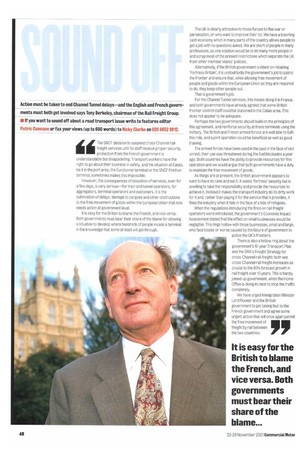6 f T r h e e i 8 S h N t s G e F rv d i e c c e i s si u o n n t t il o i t s s u s s t p a e ff n r d e c c r e o i v s e s -Cannel e r e a u i I - r 0
Page 48

If you've noticed an error in this article please click here to report it so we can fix it.
protection from the French government is understandable but disappointing. Transport workers have the right to go about their business in safety, and the situation at Calais, be it in the port area, the Eurotunnel terminal or the SWF Frethun terminal, sometimes makes this impossible.
However, the consequences of cessation of services, even for a few days, is very serious—for train and tunnel operators, for aggregators, terminal operators and customers. it is the culmination of delays, damage to cargoes and other obstructions to the free movement of goods within the European Union that now needs action at government level.
It is easy for the British to blame the French, and vice versa. Both governments must bear their share of the blame for allowing a situation to develop where hundreds of people invade a terminal in the knowledge that some at least will get through. The UK is clearly attractive to those forced to flee war or persecution, or who want to improve their lot, We have a booming cash economy which in many parts of the country allows people to get ajob with no questions asked. We are short of people in many professions, scone solution would be to let many more people in and scrap most of the present restrictions which separate the UK from other member states' policies.
Alternatively, if the British government is intent on retaining 'Fortress Britain', it is undoubtedly the government's job to patrol the frontier and ensure that, while allowing free movement of people and goads within the European Union as they are required to do, they keep other people out.
That is government's job.
For the Channel Tunnel services, this means doing it in France, and both governments have already agreed that some British frontier control staff could be stationed in the Calais area. This does not appear to be adequate.
Perhaps the two governments should build On the principles of this agreement, and reinforce security at these terminals using the military. The British and French armed forces are well able to fulfil this role, and a joint operation could be beneficial as well as good training.
The armed forces have been used in the past in the face of civil unrest; their use was threatened during the fuel blockades a year ago. Both countries have the abilay to provide resources for this operation and we would argue that both governments have a duty to maintain the free movement of goods.
As things are at present, the British government appears to want to have its cake and eat it. It wants 'fortress' security but is unwilling to take the responsibility and provide the resources to achieve it. Instead it makes the transport industry do its dirty work for it and, rather than payfrIg, it for the service that it provides, it fines the industry when it fails in the face of a tide of refugees.
When the regulations introducing the fines on rail-freight operators were introduced, the government's Economic Impact Assessment stated that the effect on small businesses would be negligible. This rings hollow with those businesses, small and large, who face losses or worse caused by the failure of government to police the UK's frontiers.
There is also a hollow ring about the government's 10-year Transport Plan and the SRA's Freight Strategy for cross-Channel rail freight; bath see cross-Channel rail freight increases as crucial to the 80% forecast growth in rail freight over 10 years. This is hardly joined-up government, when the Home Office is doing its best to stop the traffic completely.
We have urged Immigration Minister Lord Hooker and the British government to get talking fast to the French government and agree some urgent action that will once again permit the free movement of freight by rail between the two countries.




















































































































































